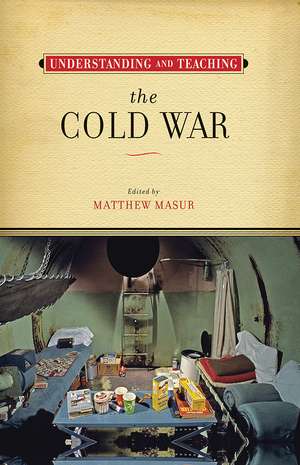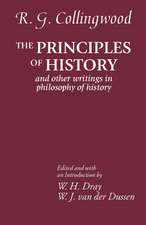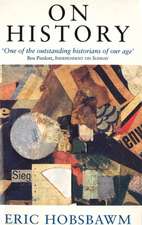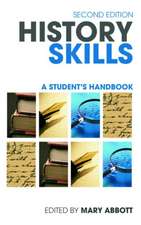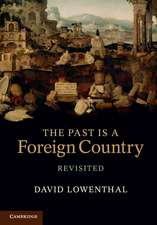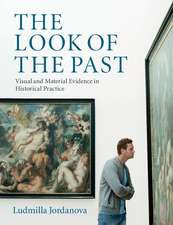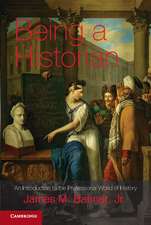Understanding and Teaching the Cold War: The Harvey Goldberg Series for Understanding and Teaching History
Autor Matthew Masuren Limba Engleză Hardback – 12 feb 2017
For nearly a half century, from 1945 to 1991, the United States and the Soviet Union maneuvered to achieve global hegemony. Each forged political alliances, doled out foreign aid, mounted cultural campaigns, and launched covert operations. The Cold War also deeply affected the domestic politics, cultures, and economic policies of the two superpowers, their client states, and other nations throughout the world.
Teaching the Cold War is both necessary and challenging. Understanding and Teaching the Cold War is designed to help collegiate and high school teachers navigate the complexity of the topic, integrate up-to-date research and concepts into their classes, and use strategies and tools that make this important history meaningful to students.
The volume opens with Matthew Masur’s overview of models for approaching the subject, whether in survey courses or seminars. Two prominent historians, Carole Fink and Warren Cohen, offer accounts of their experience as longtime scholars and teachers of the Cold War from European and Asian perspectives. Sixteen essays dig into themes including the origins and end of the conflict, nuclear weapons, diplomacy, propaganda, fear, popular culture, and civil rights, as well as the Cold War in Eastern Europe, Western Europe, East Asia, Africa, Latin America, and the nonaligned nations. A final section provides practical advice for using relevant, accessible primary sources to implement the teaching ideas suggested in this book.
Teaching the Cold War is both necessary and challenging. Understanding and Teaching the Cold War is designed to help collegiate and high school teachers navigate the complexity of the topic, integrate up-to-date research and concepts into their classes, and use strategies and tools that make this important history meaningful to students.
The volume opens with Matthew Masur’s overview of models for approaching the subject, whether in survey courses or seminars. Two prominent historians, Carole Fink and Warren Cohen, offer accounts of their experience as longtime scholars and teachers of the Cold War from European and Asian perspectives. Sixteen essays dig into themes including the origins and end of the conflict, nuclear weapons, diplomacy, propaganda, fear, popular culture, and civil rights, as well as the Cold War in Eastern Europe, Western Europe, East Asia, Africa, Latin America, and the nonaligned nations. A final section provides practical advice for using relevant, accessible primary sources to implement the teaching ideas suggested in this book.
Preț: 234.79 lei
Nou
Puncte Express: 352
Preț estimativ în valută:
44.93€ • 47.03$ • 37.39£
44.93€ • 47.03$ • 37.39£
Carte tipărită la comandă
Livrare economică 31 martie-14 aprilie
Preluare comenzi: 021 569.72.76
Specificații
ISBN-13: 9780299309909
ISBN-10: 0299309908
Pagini: 384
Ilustrații: 4 b-w illus.
Dimensiuni: 152 x 229 x 25 mm
Greutate: 0.67 kg
Ediția:1
Editura: University of Wisconsin Press
Colecția University of Wisconsin Press
Seria The Harvey Goldberg Series for Understanding and Teaching History
ISBN-10: 0299309908
Pagini: 384
Ilustrații: 4 b-w illus.
Dimensiuni: 152 x 229 x 25 mm
Greutate: 0.67 kg
Ediția:1
Editura: University of Wisconsin Press
Colecția University of Wisconsin Press
Seria The Harvey Goldberg Series for Understanding and Teaching History
Recenzii
“A superb collection of authoritative, imaginative, and even provocative essays on teaching the history of the Cold War, effectively merging historiography, methodology, and innovative use of primary documents.”—Jeremi Suri, author of Henry Kissinger and the American Century
“Inspired. Brings together historians and master teachers who offer transformative approaches to teaching the complexities of global Cold War history. The focus on a range of textual and visual primary sources from a variety of geographic spaces that work in the classroom is invaluable.”—Mark Philip Bradley, author of Imagining Vietnam and America
Notă biografică
Matthew Masur is a professor of history at Saint Anselm College. He is the coeditor of Understanding and Teaching the Vietnam War and has served as a member of the Teaching Committee of the Society for Historians of American Foreign Relations.
Cuprins
Acknowledgments
Introduction
Matthew Masur
Part One: Introductory Essays
Teaching the History of Cold War Europe
Carole Fink
Reflections on the Cold War in Asia: Then and Now
Warren I. Cohen
Part Two: Traditional Topics, New Perspectives
Origins of the Cold War
Jessica Elkind
Two Scorpions in a Bottle: Nuclear Weapons and the Cold War
Shane J. Maddock
The Soviets’ Cold War: Notes of a Diplomatic Historian
Anthony D’Agostino
The End of the Cold War in the Classroom
Mario Del Pero
Teaching the Cold War to the Post-9/11 Generation
David Bosso
Part Three: The Cold War and American Society
Teaching Propaganda and Ideology in Cold War History
Kenneth Osgood
Teaching “Fear” and “Anxiety” in the Cold War
Molly M. Wood
Using Popular Culture to Teach the Cold War
Laura A. Belmonte
Civil Rights and the Cold War Era
Brenda Gayle Plummer
National Security and the National Pastime
Thomas W. Zeiler
Part Four: The Global Cold War
Ashes and Diamonds: Viewing Poland’s Cold War through Literature and Film
Philip Pajakowski
The Cold War in Western Europe
J. Simon Rofe
Did the Cold War Really End? Teaching the Cold War from East Asian Perspectives
Hiroshi Kitamura
The Cold War in Latin America and the Caribbean
Andrew J. Kirkendall
The Cold War in Africa
Ryan M. Irwin
A Pox on Both Your Houses: Neutralism and the Cold War
Mary Ann Heiss
Part Five: Archival Collections for Teaching the Cold War
The Global Cold War: Using the Resources of the Cold War International History Project (CWIHP)
Christian Ostermann
Teaching with the Tapes: Presidential Recordings and the Cold War
Marc J. Selverstone
Teaching the Cold War with the Foreign Relations of the United States Series
M. Todd Bennett
Contributors
Index
Introduction
Matthew Masur
Part One: Introductory Essays
Teaching the History of Cold War Europe
Carole Fink
Reflections on the Cold War in Asia: Then and Now
Warren I. Cohen
Part Two: Traditional Topics, New Perspectives
Origins of the Cold War
Jessica Elkind
Two Scorpions in a Bottle: Nuclear Weapons and the Cold War
Shane J. Maddock
The Soviets’ Cold War: Notes of a Diplomatic Historian
Anthony D’Agostino
The End of the Cold War in the Classroom
Mario Del Pero
Teaching the Cold War to the Post-9/11 Generation
David Bosso
Part Three: The Cold War and American Society
Teaching Propaganda and Ideology in Cold War History
Kenneth Osgood
Teaching “Fear” and “Anxiety” in the Cold War
Molly M. Wood
Using Popular Culture to Teach the Cold War
Laura A. Belmonte
Civil Rights and the Cold War Era
Brenda Gayle Plummer
National Security and the National Pastime
Thomas W. Zeiler
Part Four: The Global Cold War
Ashes and Diamonds: Viewing Poland’s Cold War through Literature and Film
Philip Pajakowski
The Cold War in Western Europe
J. Simon Rofe
Did the Cold War Really End? Teaching the Cold War from East Asian Perspectives
Hiroshi Kitamura
The Cold War in Latin America and the Caribbean
Andrew J. Kirkendall
The Cold War in Africa
Ryan M. Irwin
A Pox on Both Your Houses: Neutralism and the Cold War
Mary Ann Heiss
Part Five: Archival Collections for Teaching the Cold War
The Global Cold War: Using the Resources of the Cold War International History Project (CWIHP)
Christian Ostermann
Teaching with the Tapes: Presidential Recordings and the Cold War
Marc J. Selverstone
Teaching the Cold War with the Foreign Relations of the United States Series
M. Todd Bennett
Contributors
Index
Descriere
Experienced teachers share innovative, classroom-tested content, methods, and resources for presenting the Cold War in college and high school classes.
